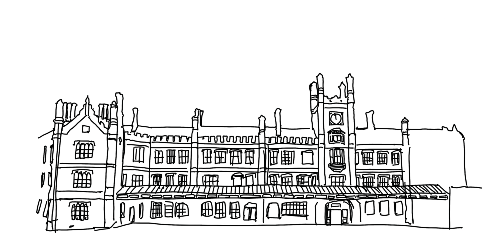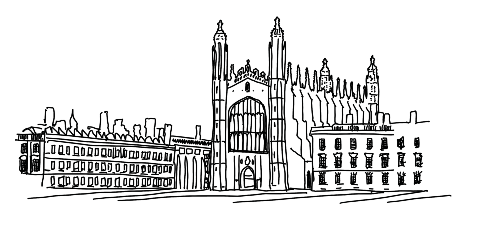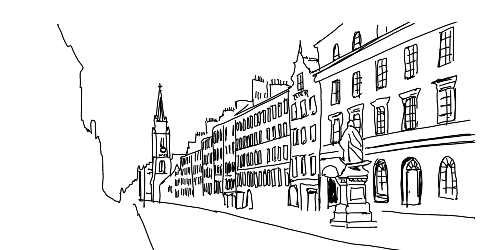Bike touring through the United Kingdom

This piece is a continuation of part two here. The story picks up again on my return train from Wales.
Rail replacement
09/27/24
I watched the fields and small stone houses flow in reverse on my way back toward Birmingham on the train. All was fine until we approached Shrewsbury, where we stopped and went no further.
The tinny voice on the intercom said that flooding from all of the rain in the last few days had inundated Wellington, one of the future stops on our line. The rail people said that buses would take us from here to Wolverhampton, skipping the flooded parts of the track. I disembarked with hundreds of other confused passengers and we funneled out to the waiting area outside the station.
We waited.
I checked several times with the stony-faced ticket agents to see when they expected the buses. I plotted alternatives, like riding my bike to Wolverhampton, but my app told me that would take three hours. I decided to wait some more. The crowd from my train grew agitated.
In the midst of the delay, I glanced around and realized that Shrewsbury was quite charming. Well-preserved medieval streets and structures surround the station. You can glance up to the parapets and towers of Shrewsbury Castle from the curb. The station itself is done in a fetching Tudor Gothic style.
If I didn’t have to be in Cambridge that evening, I would’ve started exploring the town. That’s the magic of wandering on a bike with no job and no obligations—you can just turn delay into delight. It’s easy to lock up, snap off the panniers, and hole up in a cafe to lose yourself in a book or a journal entry for a while. Or to move through quiet streets, and take pictures of secret details. And these old English towns abound in them.

A big white "Rail Replacement Service" bus did finally arrive and pull into the drop-off area. I felt stressed as I waddled over within the mass of humanity. There was no way it was going to accommodate all of us, and me with my bike no less.
The driver stepped out and promptly announced that he was taking the 45-minute smoke break he was entitled to under labor law or his union or some higher authority. This roiled the crowd immediately. People grumbled about missing connections, being late for work, or distressed family members waiting for them in places far beyond Shrewsbury.
A college-aged girl behind me emitted a sharp scream. “What the FUCK is going on?” she bellowed as she began to weep. A few of us looked at each other, recognizing the heightened anxiety spreading through the horde.
Another tour bus appeared and the mass of travelers instinctively gravitated toward its doors. The driver popped out and this time began ushering folks aboard, counting capacity as he went. A wild-eyed thirty-something man in front of me shouted at the rest of the queue “If any of yous start pushin’ I’ll scrap the lot of ya!” Though I didn’t see anyone pushing.
I happened to be well-positioned in the line. The driver let me stow my bike in the belly of the bus and board. The only open seat was next to the college-aged girl who screamed.
On the way to Wolverhampton, she began typing a poem on her iPad in an Apple Note. I tried not to look, but I saw the words:
“Panic. Like frightened rabbits.
We cannot get out,
We cannot get out.”
Restless nights
09/27/24 - 09/30/24

I arrived back in Cambridge around 9pm, a full two hours later than my original arrival time on the ticket.
Oli and Michaela met me for a pint right outside the station at the old Ticket Office, which is now a pub slinging booze instead of transport.
I felt my spirits lift immediately when we joined up. The train ride was lonely, long, and a little harrowing. After the events at Shrewsbury, I rode a series of trains without good bike amenities that added to the overhead.
The better trains have rack systems where you can hang your bike by the frame and take your mind off of it. The worse trains have a handwavy area where you lean your bike against the wall and you have to mind it so it doesn’t fall over as the car jostles. But all of the trains, it seems, put the bike storage area right next to the toilets. So you get the pleasure of smelling and sometimes hearing that for the duration of the journey.
Over beers, Oli and Michaela told me about their work weeks and I regaled them with tales from the day and my journey through Anglesey. We went back to the house and ate Indian takeout.
Oli and I have a way of egging each other on, and we stayed up until 4:00am. I can’t honestly remember what we were doing for so long. But he brought out more of his old things as the hours ticked by. There was a newspaper recording commodities prices from the 1800s that I read aloud in a British accent. He also brought out a blanket with a tasselled fringe that reminded him of the one we used to keep on our couch when my family lived in England.
The next day we cycled through Cambridge and Oli and Michaela pointed out the various colleges and famous places. Isaac Newton attended Trinity. The likes of John Maynard Keynes, Alan Turing, and James Galbraith went to King’s. Its main attraction is the gigantic Gothic chapel that looks like a cathedral.
We exclaimed “Christ, that’s a nice park!” as we passed Christ Park by the college of the same name.
The streets around the university in Cambridge were thronged with tourists from all over the world. Punters wended their way down the Cam. Cows walked freely across the green spaces. The university grounds reminded me acutely of Hogwarts.
That evening, Oli played his show at the Cambridge Junction venue. His parents, Darren and Sarah, arrived at the house to drive Michaela and me over. To my eye, they hadn't changed in the slightest. We hugged and caught up for a while in the living room, sipping tea in the warm lamplight. By this point, I felt like I’d perfected my decade-in-review speech for these reunions with old friends.
Along the way over to the Junction we picked up the band's bassist, Eli, who works during the day as a cancer researcher in a lab at Cambridge. Josh Robins, her partner, is the singer-songwriter. He’s intense and captivating with his belting voice and vagabond vibe. I got the impression he’d lived a difficult life, as though he had some scars on his soul. But it seems like a few of those tend to make for great music.
When Josh wasn't playing in venues around Cambridge, he was doing small concerts inside of narrowboats, or busking in Spain. He lives in a van, which Eli pointed out to us behind the venue as we rolled up.
Oli is a goofball until he steps on stage. His mustachioed mouth tightened, and a serious look came over his face as he concentrated on the notes and chords, the purplish lighting washing over his shoulders.
I sat there, marveling as my oldest friend practiced his art. I remembered the days at his parents’ old house in Burwell, back when he first picked up the guitar. He’d show me little riffs he was learning, like “Smoke on the Water,” and I assumed it was just a passing hobby—something kids do before losing interest. But he stuck with it.
Watching him now, a lump rose in my throat as he effortlessly strummed through his solos. The stage lights danced, and the crowd was transfixed. In that moment, I just felt gratitude.
The taste of years
09/30/24 - 10/08/24

It seemed like all my transition days were rainy. The sky spat down as I pedaled the path along the tracks toward Cambridge’s station.
I was exhausted. I actually looked forward to the train ride up to Edinburgh so I could catch up on a little sleep. Oli and I proved unable to go to bed at any reasonable time while I stayed with him and Michaela.
After the concert, I helped Oli and the band pack up and we went out drinking. They showed me local spots, like Six Bells, and how to “split the G” on the Guinness glass. I tried a few times and just couldn’t nail it. But Michaela did on her first try.
Josh, Eli, and I tipsily talked about capitalism and America.
Whenever one establishment would shut down for the night, the crowd knew exactly where to go next. We finished our long crawl in the smoky upstairs band room of The Six Six bar. A man dressed in fuzzy yellow pajamas, who no one appeared to know, attempted to sleep on the couch behind us as the group talked loudly, drank Carlsbergs and puffed cigarettes. We got back around 4:00am again.
My train changed at Peterborough and I got into Waverley in the early afternoon. The city crowds in around the station like two mountain ranges running alongside a deep valley. You emerge up out of it in the damn middle of everything. The honking cars clogging the streets, the tour buses, the mobs of tourists. I tried not to club anyone with my bike as I heaved it up on my shoulder to go up the staircase.
I checked in at the “CoDE Pod” on the Royal Mile. The journey there was encouraging. You climb a big hill to the south of the station, ascending the staircase up Warriston’s Close, weaving between the beautiful and sprawling stone buildings with their mix of medieval, Victorian, Georgian, Neo-Gothic, and Scot Baronial architecture. I liked peering down the many secretive closes that branch off High Street.
Where I stayed was a bit of a gamble for me. I wanted to see if I could still stand for the dorm-style rooms of a hostel. In my early twenties, it wasn’t that big of a deal. A bunk in a room full of strangers also tends to be very cheap. About a tenth of the nightly cost in one of the proper hotels in Edinburgh, or one and a half percent of a stay in the Rowling room at the Balmoral, where J.K. Rowling supposedly finished The Deathly Hallows in 2007.
The CoDE Pod is in part named for the Japanese pod hotel-style bunks which appealed to me upon seeing them online. A little more privacy and, perhaps, soundproofing, I thought. The hostel also sits in a building that used to contain jail cells and a courthouse built between the late 17th and early 18th centuries. So the whole thing has a jailhouse theme to it. I thought that the location by St. Giles Cathedral, bang in the middle of the city, might be a good base of operations to explore.
I signed up for a Scotch tasting in the hostel’s basement (an old set of chambers they only rediscovered in recent decades) as a way to try to meet other pod people to hit the pubs with. But I was the only person on my tour who was actually staying there. There were a pair of reserved German girls in their twenties, an older German gentleman who was quietly having some kind of religious experience with the Scotch, and a young couple who hardly interacted with the group. The whisky was pleasant. I got to sit in the old judge’s chair and get a photo.
I managed to strike up conversation with the German girls, who seemed to think it equivalently interesting to speak with an American. They were from some city in the north like Hamburg. When I said I wanted to visit Munich, they talked a lot of smack on Bavarians, describing them as hard-drinking bumpkins. I think it only convinced me to go all the more.
We parted ways and I wandered around the Royal Mile. I tried to get into dinner at Deacon Brodie's, but failed with the crowds. So I strolled a ways down Forrest Road and got bangers and mash at MUM’s Great Comfort Food, which was a strange little spot. The giant photo on the wall depicted an unnerving sixties-era man in a tie being served a plate of sausages. They were delicious though.
I didn’t really want to go back to my pod right away, so I returned to Deacon Brodie's and listened to a Scottish singer-songwriter croon covers of pop songs while I worked on a pint. When they closed at midnight, I reluctantly ambled back down the Mile, which was refreshingly quiet and still.
I confirmed that I can’t sleep through the random noises of group rooms anymore. The pods offered no sound protection. Someone got up at 3:00am, presumably to catch a flight. They zipped and unzipped their suitcase repeatedly. The heavy door to the room opened and closed all night. My eyes opened each time at the sound of tapping on the keypad and the click when the lock released. It became ferociously hot in the enclosed space of my pod.
I woke feeling terrible.
I wanted to get away from the buzz of the Royal Mile. Everywhere I went for a bite or a drink in the vicinity of my hostel gave me the feeling you get when you go to Disneyland. I was seeing the curated, sculpted version of Edinburgh and Scotland that foreigners want to see. It’s an experience served up on a tartan platter with haggis by someone in a kilt. Street performers blasting Amazing Grace on bagpipes for teary-eyed Americans.
I cycled over to Arthur’s Seat, which is a volcanic mound to the southeast of the center of town that offers a sweeping view of the city and the sea beyond.
I chained my bike to a tree since I came at the Seat from the wrong side and couldn’t find a proper parking lot. I hiked up to the summit and stared out for a long time as the wind howled, unsure of what to do with the rest of my day. I needed a mission, even if it was just motion.
After staring at maps on my phone for a long time, my gaze settled on the city of Inverness, about a 200-mile ride on a route I charted through Stirling.
I ditched out on the second night I paid for at the CoDE Pod and went to a cheap hotel I found on Forth Street and scored a gargantuan room that was on discount for about a hundred bucks. It had a grand piano and tall windows. It was beautiful and tranquil. I woke the next day feeling the best I had in a week or more.
I just started pedaling.
I cycled 40 miles to Stirling, 50 miles to Ardeonaig, 60 miles to Kingussie, and 50 to Inverness, overnighting at the end of each leg.
When you’re riding a bike through the north, you get the ungroomed and mysterious side of the nation that frightened the Romans centuries ago. They built Hadrian’s Wall to keep back the Picts, who roamed these hills and lived by their own law. It’s rugged country that feels a lot like the Western US.
In Loch Tay, I kicked the stand down on my bike and ate a Yorkie chocolate bar on the beach in Kenmore. I stared out for an hour at the vast expanse of green-gray water, which reflected the moody clouds above. The forests that flank the loch shimmered in and out of patches of sunlight. Tiny freshwater waves gently lapped the stony shore.
Fifteen or so miles from Inverness, the terminus of my adventure, I stopped into Tomatin Distillery, where I met Richard, who I’d place in his late sixties or early seventies. His face was lined and he spoke with a mild brogue. He was working the bar and patiently guiding patrons through tastings. He set me up with a flight of three glasses and explained the process of a proper whisky sampling.
Take it slow, he said, and make the dram last. Never judge it on the first sip. Let it absorb under the tongue. Sip water, then try again. It’s about the leisurely appreciation, he noted, and being present with the complexity. Look past the barrel oak and find the subtler things. Maybe hints of the soil in which the barley grew, or the minerals in the mash water. How much is real or imagined doesn’t particularly matter. All that really matters is that you’re there in the moment trying to make sense of it. That’s why you pay the money.
Richard departed and left me to my thoughts.
There always comes a point for me on travels like this when I’m ready to return home and I had reached it. When the anxious energy to see the real world, generated by months of working at a computer in an invented realm, is spent. I ruminated on my trip, weeks long at this point. A mixture of fast motion and contemplative, slow moments. Chaotic cities, and the misty, silent fields of my childhood.
I made my way through the pours of steadily older expressions. Beyond the surface-level flavors of toffee, vanilla, and nutmeg, I tasted the years pass between them.
